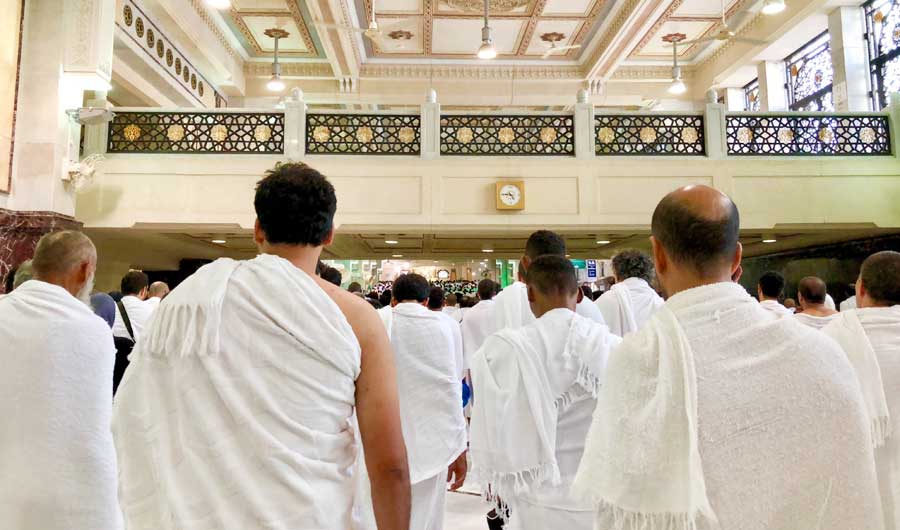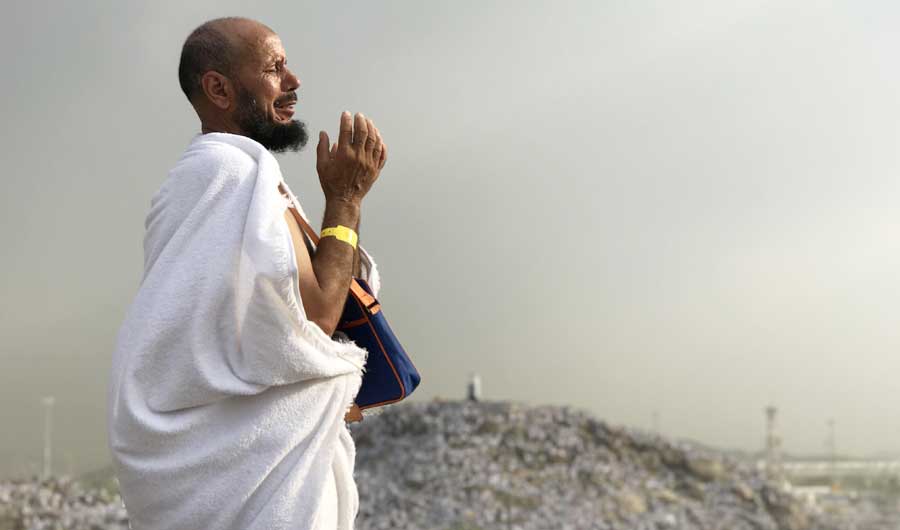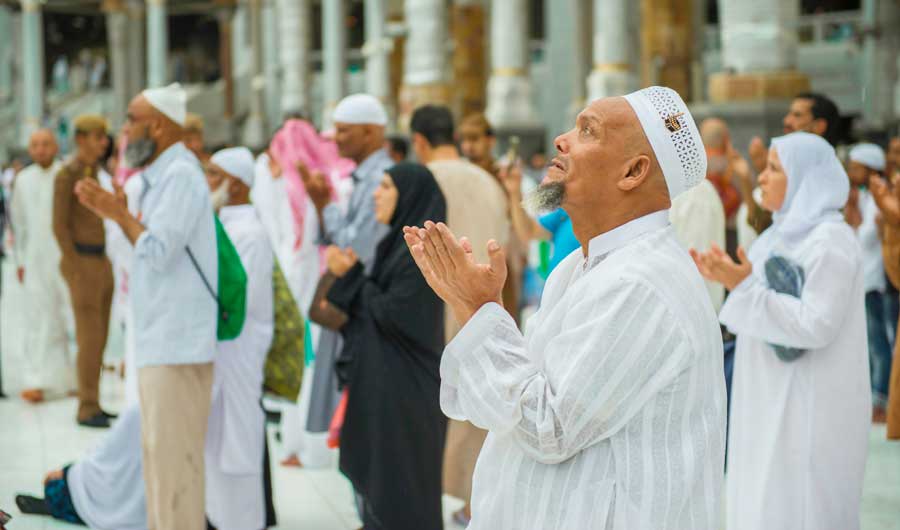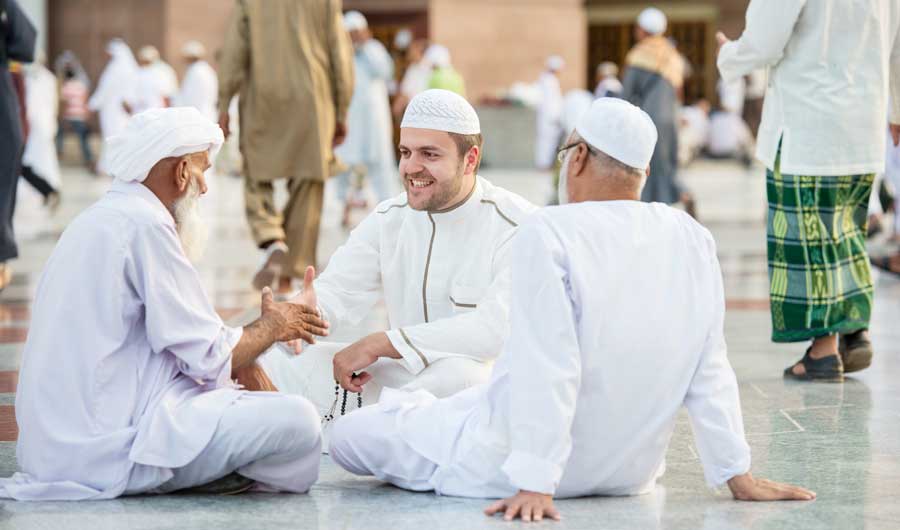JEDDAH: Pilgrims specially picked to perform this year’s Hajj have described their joy at being given the chance to carry out the holy ritual amid the ongoing coronavirus disease (COVID-19) pandemic.
Due to the global health crisis, Saudi Arabia has only allowed a select number of worshippers to take part in the annual pilgrimage.
Just 60,000 of 500,000 Hajj applicants were chosen to participate in the religious event that attracted approximately 2.5 million pilgrims in 2019 alone.
Those selected for this year’s Hajj had to meet a number of specific requirements which included having been fully jabbed against COVID-19 with any of the Pfizer, AstraZeneca, Moderna, or Johnson & Johnson vaccines.
Um Azzam, 53, and her husband Abu, from Riyadh, were both given the green light to attend Hajj.
She told Arab News: “We received the text message on the night of June 24 and the feeling was completely indescribable joy and happiness. We were hoping and praying to perform Hajj and our prayers were answered.
“Why should we be afraid (of performing Hajj during the pandemic) when we trust in Allah and are delegated to him? On top of that, we have taken our vaccines and trust in the precautionary measures.”
I’m not saying it isn’t possible to get infected, but it definitely wasn’t a concern of mine because I felt safe with the number of people going and the strict precautionary measures we must follow.
Um Mazin
Mariam Mohammed, and her mother Um Mazin, an American citizen living in the Kingdom, were also selected to visit Makkah and the 24-year-old, from the Eastern Province, said it would be her first trip to the holy city as a pilgrim.
“I’m so excited. I’ve always wanted to perform Hajj but, for some reason, it just never worked out. But it did this time.
“I don’t feel scared or nervous. I wouldn’t let my fear of being infected (with COVID-19) stop me from taking this opportunity. I could literally get COVID-19 in my own city, so I might as well perform a powerful religious task,” she added.
And her mother said the threat of contracting COVID-19 had never crossed her mind when submitting her Hajj application. “I’m not saying it isn’t possible to get infected, but it definitely wasn’t a concern of mine because I felt safe with the number of people going and the strict precautionary measures we must follow.
We received the text message on the night of June 24 and the feeling was completely indescribable joy and happiness. We were hoping and praying to perform Hajj and our prayers were answered.
Um Azzam
“I also assume that since the government has done so well in controlling the virus, it will be even more careful when it comes to the Hajj season.”
She noted that her daughter’s application had initially been turned down due to her Saudi nationality.
“It was explained to us that there were too many Saudis attending Hajj and they (Saudi authorities) wanted to give the chance for others to perform too. I had no idea that they had a quota for non-Saudis, although it’s actually a great idea.”
Mohammed’s rejection was later overturned due to her relationship with a non-Saudi pilgrim, her American mom.
However, Abu Hassan, 55, from Jeddah, was not so lucky. He told Arab News that he had registered for Hajj online but despite being at first accepted he later received a message to say his application had been unsuccessful.
He said: “It was disappointing at first, of course. The last time I performed Hajj was over 28 years ago, so I was really excited to go this year, especially with this amount of people.
“I appreciate a lot of what they (the government) have done in the process of registering electronically. And attending Hajj this year wasn’t meant to be, Allah has other plans for me, so I’ve fully accepted the outcome,” he added.
But for Mohammed Al-Hokair, 22, from Riyadh, the outcome was better. “We heard on the news that Hajj this year would still be going ahead, so everyone in my family, my parents, sister and I, immediately began the registration process.”
He and his sister’s applications were initially refused but they were then accepted because he was registered as a companion to assist his parents.
“We got the approval three Fridays ago and at first I was feeling nervous. But that didn’t last and now I feel very secure and safe.
“The rule for performing the pilgrimage is at least once in a lifetime for whoever is capable, and I am capable and got the opportunity, so why shouldn’t I go? I mean, this is a plan from Allah and so if I’m meant to attend Hajj this year, no matter what, I will attend it. And this will be my first time, so I am also feeling excited now,” Al-Hokair said.
However, he pointed out that many of his friends and family members had not been so fortunate.


















